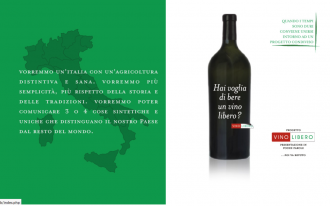Is Free Better?

I've always found that when you take time to think things over you usually get a clearer understanding of them. This is why I expressly held off on weighing in on the latest initiative from Oscar Farinetti, the man behind Eataly, which he has called 'free wine' and that was launched as new sales pitch two weeks ago. I also first wanted to see the obvious and expected reactions both for and against. There were those who wanted to raise him to sainthood immediately, while others were totally against it based on ideological bias. Farinetti is without a doubt an intelligent man and marketing expert and he began his latest crusade by putting on the front line those companies in which he has a controlling interest, his strategic investments, with names familiar to all: Fontanafredda, Mirafiore, Borgogno, San Romano in Piedmont, Monte Rossa in Lombardy, Serafini & Vidotto in Veneto, Le Vigne di Zamò in Friuli and so on. He set down for these companies a protocol that has at its center transparency, sustainable viticulture and 'friendly' wine-making, with a diminished use of sulfur, something which today seems to be for many the biggest problem facing the sector (how about the fact that it is allowed in greater quantities in other foods, eh Oscar?).
His initiative somehow opened the floodgates. The 'organic-Taliban' screamed he had ripped off issues that they were the better champions of, even if the vast majority of consumers do not know anything about them. Others complained that this was just a clever marketing scam, as opposed, perhaps, to their 'stupid' one, which has been totally ineffective. I, on the other hand, would have above all first asked: cui prodest, who benefits? In other words, why would it be better to drink a 'free wine' as opposed to a 'normal wine'? Does it taste better?Does it cost less? Does it substantially help the environment? And, if so, how? It is not enough just to say it, you have to prove it, too. There is, for example, the ISO 14000 family of standards that offer a scientific method of calculating the impact various products have on the environment. For example, were I to opt for manual weeding, but with the use of a rototiller, would the pollution caused by the machine's combustion engine be greater or less than if I were to use a limited amount of chemical weed killers? I want to know this based on tangible, scientific data, facts not just principles and impressions. And then what effect does all this have on the cost of the final bottled product? In other words, what is the cost/benefit ratio. A certain man named Sutter, the one who produces Emulsio, explains in his ad campaign that using concentrated detergents, which are later diluted with water, saves an incredible amount on packaging and thus also shipping and handling. His is an interesting argument.
In regard to 'free wine', perhaps because it is a novelty, I think a lot of the bruhaha has to do with Farnetti's personality and skill, the fact that he does not demonize marketing the way some wine 'fundamentalists' do, even if his approach is frankly not that much different from those of Slow Food and slogans like 'good, clean and correct'. And so I can only encourage my friend Oscar, tell him his initiative is a good one, even if I would have expected something more, much more, to target those 'normal' people he finds so 'marvelous', and so do I.

 Italiano
Italiano







